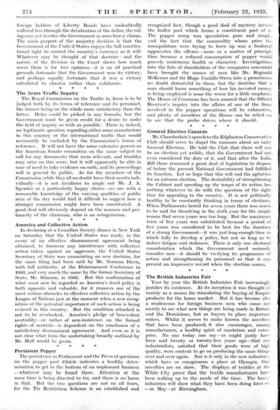America and Collective Action In declaring at a Canadian Society
dinner in New York on Saturday that the United States was ready, in the event of an effective disarmament agreement being obtained, to forswear any interference with collective action taken against an aggressor, the United States Secretary of State was enunciating no new doctrine, for . the same thing had been said by Mr. Norman Davis, with full authority, at the Disarmament Conference in 1933, and very much the same by the former Secretary of State, Mr. Stimson, in 1932. But this reaffirmation of what must now be regarded as America's fixed policy is • both apposite and valuable, for it removes one of the most serious obstacles to effective collective action by the League of Nations just at the moment when a new recog- nition of the potential importance of such action is being evinced in this country. But the condition attached is not to be overlooked. America's pledge of benevolent neutrality—or rather of non-insistence on the formal rights of neutrals—is dependent on the conclusion of a satisfactory disarmament agreement. And even so it is . not clear what form the undertaking broadly outlined by Mr. Hull would be given.


















































 Previous page
Previous page